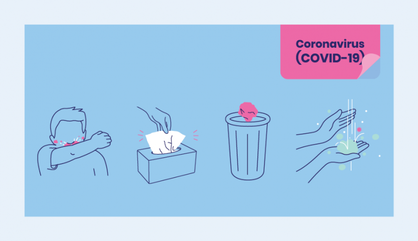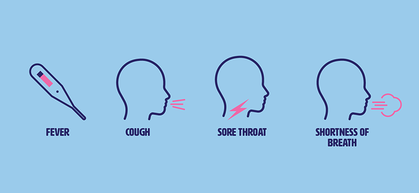|
A MESSAGE FROM THE PRINCIPAL CLINICAL PSYCHOLOGIST:
I wanted to take some time to reach out to all of our clients and the community in general. It is a difficult time for everyone at the moment and there have been many changes in Australia, as well as across the world, in a short period. The arrival of COVID-19 on our shores has presented many challenges for individuals and businesses alike. I wanted to assure everyone of the measures we, at Oracle Psychology, are taking to ensure the upmost safety of our clients and staff. Due to the current confusion and anxiety in the community at large, I am also hoping to provide some education and resources to people in order to provide some additional support. In this announcement I will discuss health and mental health resources, hygiene and safety, social distancing policy, the importance of our clinicians providing ongoing support to clients as well as families, and child psychology telehealth options at Oracle Psychology. HEALTH & MENTAL HEALTH RESOURCES: There have been instances of misinformation online and in social media regarding the current pandemic which have caused people undue distress. As such, I would like to encourage everyone to choose their sources of information carefully when informing themselves, their friends and their family. Even some of the mainstream media outlets are adding to community anxiety, so I would like recommend that people gain their information directly from Government websites and announcements. This will ensure you are provided with the most reliable and evidence based information, which can help to reduce anxiety and panic. The Australian Government Department of Health website has the most up to date information regarding symptoms, recommendations and the current status of the pandemic. The Australian Government Head to Health website also has a wealth of useful information and resources. This includes specific mental health information to assist individuals with maintaining good mental health during the pandemic. The below links provide additional information which can help with reducing anxiety, avoiding panic, minimising excessive worrying and maintaining a balanced outlook:
HYGIENE & SAFETY Oracle Psychology has utilised the latest advice from the Australian Government Department of Health in order to develop a COVID-19 Management Plan. This is aimed at maximising safety and hygiene for clients as well as staff. Current expert advice is to actively maintain good hygiene to protect against the spread of infection in day to day life. Good hygiene is a requirement for all of our staff and includes:
We have multiple hand sanitisers available in every consulting room and waiting room, for the convenience of clients and staff. We also clean and disinfect surfaces every day. We have weekly staff meetings where COVID-19 updates are provided, in line with best evidence and expert advice. Email advice is also provided to staff as the situation develops, in order to ensure we are practicing the recommended health and safety measures. All staff members are required to notify me immediately if they or one of their family members are unwell. No staff member will be at our clinic if they are unwell and they will be required to obtain clearance from a medical practitioner before returning to work. Any staff member returning from overseas will also be complying with all Government requirements in relation to self-isolation. SOCIAL DISTANCING We are complying with all of the Government's social distancing requirements, including no hand shaking. We are also looking into further safeguards and we appreciate our clients' understanding and cooperation. As an added protection we are asking clients, wherever possible, to only attend the clinic with one support person or caregiver. We are making this request in an attempt to minimise the number of people attending the clinic at one time. Of course, we understand that in some instances this may not be possible, as other family members may be required to attend also. We also ask that you do not attend the clinic if you are unwell. We hope to keep everyone as safe as possible and to reduce the risk of infection. Please advise us as soon as possible if you are unable to attend due to illness. Our company policy on cancellations of less than 24 hours still remains, even throughout the current COVID-19 pandemic. The reason for this is that we are still required to cover our business overheads in order to maintain continuity of service for our clients. The Government is hoping to minimize the social and economic impact on individuals and businesses by offering telehealth as an alternative. CONTINUING TREATMENT & CHILD PSYCHOLOGY TELEHEALTH In these uncertain times it is important for Oracle Psychology to continue to provide supports to our clients. There will be added pressure on all families in the coming weeks as we adapt to the changing world. We have a treatment continuity plan to ensure that we are able to continue to assist children, teenagers, young adults and families in these times of additional need. I would like to encourage all clients to continue treatment with their clinicians in order to promote their overall well-being and functioning. The current challenges facing our communities will mean that it will be essential to maintain good mental health and connection with important support networks. We aim to continue to be available for face to face consultation unless directed otherwise. This is in line with current expert advice and the aims of the Government. However, we are offering all clients the option to access their ongoing treatment via telehealth services. Our Child and Adolescent Psychologists are experienced in the provisions of our professional consultations via digital modalities. Utilising telehealth means using phone calls as well as audio and video conferencing options. These technologies offer significant opportunities for families, in these times of social distancing. We have many strategies and tools at our finger tips to help children and adolescents engage in accessing professional support from the comfort of their homes. Our telehealth consultations are informative, creative, interactive and helpful. Many young people are already very comfortable with social interactions via the Internet and this can build on their previous experiences. Using telehealth is a simple process that we would be happy to help you understand and set up. Please call 02 4929 2223 if you would like reception to help and explain these options. Unfortunately, due to the nature of assessments, we cannot offer telehealth for these services at this time. Only treatment sessions can be accessed via telehealth. The Australian Government understands the need for individuals to continue their treatment with Psychologists and other health practitioners. They have already announced changes in support of telehealth options given the current pandemic. In the event that the Government no longer allows clinic visits, I can assure all of our clients that we are well placed to continue to provide supports via telehealth.  Having a child can be the most positive experience in an individual's life. The moment you first see your newborn's face cannot possibly be put into words. The birth of your child is marked by euphoria, mindfulness and an immense sense of responsibility. As the days and months pass by parents quickly realise that unfortunately children and teenagers do not come with a manual. Parenting is not always straight forward or clear and sometimes the rules change. This can make parenting for the first time a daunting and scary experience. There are so many unknowns and questions when raising children: "When should we start toilet training?" "How can I promote my child's self-esteem?" "Should my children sleep in their own bed?" "What are the best ways to handle misbehaviour?" "How much iPad time it too much?" "Why does my teenage child want to spend less time with us now? Are we doing something wrong?" "My child doesn't look me in the eyes, should I be worried?" This is just a brief example of some of the questions racing though most parent's minds. There is an infinite amount of other concerns which parents are faced with day to day. Many parents have the same concerns about their children and it can be difficult to know what a regular part of a child's development is, as opposed to something you should be concerned about. For instance, many children can go through periods of being scared to sleep at night or separating from their parents. To some extent this can be an expected part of child development. However, in other instances where a child is excessively anxious or afraid for extended periods, or following trauma, it can be essential that families seek professional help. True also is the complexity of understanding the teenage years. Parents can be overwhelmed with the dramatic physical and emotional changes in their adolescent child over a relatively short amount of time. Teenagers can become moody, withdrawn and they can isolate themselves from family. In some circumstances this can be an expected part of development. It may be the natural path your child is taking as they transition from a a dependent child to an independent young adult. However, such social and emotional changes in extremes can also be a hallmark feature of mental health decline, such as depression and anxiety. Since there is no parenting manual to assist in raising your child, professional help and guidance can be beneficial to some families. Child and Adolescent Psychologists can provide an objective perspective and professional advice. While Psychologists often work with individuals, in the paediatric and adolescent arena it can be important to involve other family members such as parents and even siblings. Of course, this would depend on the individual circumstances of the client and it would need to be clinically appropriate as well as with consent. For instance, children with emotional regulation difficulties and anger outburst can benefit greatly from individual psychological support from qualified clinicians. However, the younger the child the more likely that a parent will be involved more actively in the sessions with a Psychologist. This allows parents to learn the strategies taught to the child also and assist their children to implement them day to day. Parent involvement also allows for Mum and Dad to draw on the extensive knowledge of Child Psychologists to broaden their own knowledge. Parent involvement in adolescent sessions would depend on the teenager providing consent. In many instances clinicians can encourage teenage clients to involve their parents or consent to Psychologists providing feedback to Mum and Dad. In several ways this can promote positive outcomes for the individual, as it allows parents to gain a greater understanding of their child's needs and perspective. It can also further develop communication skills and independence. It is also important to note that, while children do not come with a manual, parents can use Child and Adolescent Psychologists as an interactive manual for childhood development. They can request individual sessions with clinicians for psychological consultation and advice about parenting even if their child is not seeing a professional. This can be helpful for mothers and fathers as it can guide them in best practice with parenting or how to respond to emotional and social changes. It can also be helpful for parents to seek advice with assisting their children during life changes such as how to best parent after separation. There are many ways Child Psychologists can help families. Clinicians can work with individuals or groups. The can assist one family member or many. They can give parenting and developmental advice to put things in perspective. While there is no parenting manual we can guide you on your parenting journey. Contact us today on 02 4929 2223 or email us for further information.  For your child, the benefits of having a pet cat are far-reaching. It’s a big responsibility though, so teaching children safe techniques for bonding with their pets is paramount. In an article by Advantage Petcare on ‘Introducing Cats To Children', our experts at Oracle Psychology contributed practical advice for parents to encourage and enhance successful bonds. As director of Oracle Psychology, Mr Daniel Wendt offers a unique combination of qualifications in both education and psychology, to assist children and young people. Perhaps one of the greatest positives that pet ownership can have for children in terms of wellbeing, is to teach children valuable lessons in empathy, compassion, friendship, and maturity. We advise that one of the best ways to create a strong bond between your child and their cat is to have them take part in the care of their pet. Allowing children to look after the cat by feeding it, grooming it and showing it love, gives them a sense of ownership and encourages them to make strong connections. Talk to your child about the cat’s feelings along the way, so they understand the impact they have on their pet’s life. In doing so, having a pet cat benefits the mental health and development of your child. Another important lesson is letting your child be involved in looking after their pets. This can help promote self-esteem, increase play skills and grow social connections. In some instances, pets have been shown to assist children with developmental conditions, such as Autism Spectrum Disorder, to become more interactive within the family. It’s important to consider your family’s individual circumstances before committing your time, love and attention to caring for a cat. However, if you do, there are huge benefits that can result from the special bonds formed between children and their pets. AuthorMr Daniel Wendt, specialises in the psychology of children, teenagers and young adults in the Newcastle, Hunter and Central Coast regions of NSW. The team at Oracle Psychology are expert Child and Adolescent Psychologists who are registered with the Psychology Board of Australia.  Unfortunately parenting does not come with a manual and your child's development can be a confusing journey. This is where guidance from an experienced professional can help. Child Psychologists play an important role in helping children, parents and families as a whole to understand each other better. As well as identifying and treating a wide range of childhood conditions, Child Psychologists can explain behaviours and emotions to parents so they know how to best help their child achieve their potential. Child Psychologists are qualified professionals with postgraduate qualifications in human behaviour. They use their highly developed skills, knowledge and expertise to develop a deep understanding of a child's needs, feelings and motivations. These professionals can help children develop social skills, teach them to regulate their emotions, encourage healthy self-esteem and increase their insight. Parents can also benefit by learning skills to respond appropriately to a child's behaviours and feelings with the aim to promote development and reduce unnecessary stress. Children are often referred from a variety of sources and for a diversity of reasons. For instance, a child's teacher may suggest to a parent that contacting a Child Psychologist may be a good idea if they believe a child is struggling to reach their potential. Many parents also self-refer to gain insight into their child's needs and to seek guidance about their child's development. Some concerns may be age appropriate and could respond quite quickly to treatment. However in some instances children may benefit from more comprehensive assessment and diagnosis to better clarify and communicate their needs. This can help address any developmental delays or mental health conditions, as well as facilitating access to appropriate supports. Overall, it's important to remember that Child Psychologists are there to help and ultimately want to assist children to reach their potential. Their goal is for families to interact and communicate better, while helping children to lead happy and successful lives. Our Child Psychologists in Newcastle help many children and families on a daily basis. Contact us now for more details on how we can help you and your family. Newcastle Child Psychologist Daniel Wendt discusses childhood tantrums. The National Disability Insurance Scheme (NDIS) is a program which is already helping many people with disabilities and special needs in the Newcastle, Hunter and Central Coast areas. It is run by National Disability Insurance Australia (NDIA) which provides funding to eligible individuals in order to access ongoing supports and important early intervention services. Roll out of the scheme nation wide is commencing in July 2016 to assist all eligible individuals in accessing supports.
NDIS can assist eligible children, adolescents and adults with a recognised disability or special needs diagnosis such as an Autism Spectrum Disorder (ASD). The program outsources funding to registered providers such as Oracle Psychology to implement treatment and supports. Approved funding can include assistance from Psychologists, Occupational Therapists, Speech Therapists, Case Managers and Support Workers. However individual supports need to be approved and negotiated with an NDIS planner. The importance of early intervention is well documented in the research literature. Many childhood conditions benefit from early identification and treatment. By recognising and addressing needs in children, clinicians can promote more positive outcomes in adulthood. Mental health diagnoses such as anxiety and depression can also benefit greatly from treatment in childhood and adolescence which further highlights the benefits of early access to services. If you or a family member may benefit from accessing support through NDIS you can contact them directly on 1800 800 110 to enquire as to possible eligibility and the application process. Our Child Psychologists are registered to provide a range of supports and services to participants once a formal plan for funding is approved. We can also provide assistance through private health fund and Medicare rebates for eligible clients. Dyslexia is a condition that many professionals and parents often misunderstand. In the community it is often incorrectly believed to be a visual difficulty when in most instances this is not the case. Dyslexia is a condition which affects a child's ability to efficiently process sounds and link them to letters. It's important to identify Dyslexia early in a child's life in order for them to get the help they need.
One to one direct reading instruction by a qualified professional is extremely important if your child is diagnosed as having Dyslexia. Commencing intervention as early as possible in a child's life promotes success and improves outcomes. Children with Dyslexia can become functional readers and can have the same opportunities as others. If your child has reading difficulties and is falling behind in class talk to their teacher as a first step. Teachers can give you an indication of where exactly your child's literacy levels are compared to other children. Monitor your child's difficulties and give them individual support. Read to them and with them regularly. Start with the basics and try and make it fun. Give them choices over what they can read and appeal to their interests. There are many great iPad apps to help with developing fundamental reading skills. Look up 'phonological processing', 'phonics games' and 'children's reading games' in the app store initially to get some ideas. It's important to remember that all children develop at different rates with regards to academics, social skills and language. Some children do need more time to develop certain skills however sometimes it is more than just a delay. 5-15% of children experience Dyslexia which is a brain based disorder and not merely a delay. If your child has Dyslexia or another learning disorder early assessment and treatment is extremely important. If you have ongoing concerns, your child is not improving or you feel that there is more to it than just a delay your child may benefit from a comprehensive learning assessment. An assessment by a Child Psychologist will provide a detailed overview of your child's learning strengths and weaknesses and can identify learning disorders such as Dyslexia. If you have further questions about Dyslexia you may be interested in viewing this article which provides a good overview for parents. You can also call us on 02 4929 2223 and we would be happy to help you and your child. Many people misunderstand Attention Deficit Hyperactivity Disorder (ADHD) and confuse what this means for a child. Just like a puppy exploring the world for the first time, all children can be excitable, curious and impulsive. They can get themselves into trouble by activing before they think. When this happens occasionally it can be considered a normal part of child development. However if a child is consistently getting themselves into trouble for excessive levels of energy and not stopping to consider the consequences it may be time to seek a professional opinion from a Child Psychologist.
Although the name ADHD would suggest concentration is the primary concern in such children, impulsivity is actually the hallmark feature of this condition. These individuals can often get themselves into mischief even before they realise what has happened. Their thoughts and ideas can come so rapidly that they are overwhelmed and distracted. They struggle with impulse control to block out distractions which leads to inattention in the classroom. If we imagine that everyone has a 'stop sign' in their mind which helps them to think before acting we can begin to understand what it can be like for children with ADHD. For example, if you are driving in your car and get cut off in traffic you may automatically have an urge to react in a "not so civil way". But your 'stop sign' in your mind comes up and tells you to calm down. Everyone has something like this 'stop sign', even children with ADHD. However children with this condition have a slower 'stop sign' than everyone else. By the time their 'stop sign' tells them to stop they have already gone ahead with their urge and landed themselves in a huge mess. At that stage they can then feel quite remorseful and guilty regarding their actions. This can lead to self-esteem issues later in life. It is important to remember that ADHD is a neurological condition which means such children are wired to respond differently to other individuals. They are often oversensitive to rewards and very resistant to consequence or punishment. This means that they can be very motivated to earn incentives but not respond much to losing privileges. They can be quite eager to please and do the right thing but their automatic urges take over before their 'stop sign' can help them out. This means children with ADHD need to be managed in different ways to the average child and this is where Psychologists can help. Of course, when considering if a child has a diagnosis such as ADHD a thorough assessment is always important. There is a lot of controversy regarding the over-diagnosis of this condition. Other disorders such as Dyslexia or anxiety can mimic some of the symptoms of ADHD so we need to make sure the correct needs are identified. It's important to remember that those who genuinely have ADHD can struggle on a day to day basis and can benefit from the help of professionals. A comprehensive diagnosis of ADHD by a Child Psychologist can include an intellectual assessment, observations, clinical interview and neuropsychological assessment. If you are interested in information regarding a comprehensive assessment by a Child Psychologist please call us on 02 4929 2223 and we would be happy to help. Our understanding of intellectual and learning difficulties has come a long way in the last 100 years. We are now able to use comprehensive educational, academic and intellectual assessments to assist in identifying a child's or teenager's learning strengths and weaknesses. With the start of the school year just around the corner it can be helpful to consider where your child's learning is currently placed.
Child Psychologists and Adolescent Psychologists use a wide variety of research based assessment tools to investigate learning strengths and weaknesses. Intellectual ability, memory, concentration, attention and language processing are all factors which can impact on a student's performance in the classroom. An experienced Psychologist can help investigate these areas of a child's functioning and determine how to best meet their learning needs. Difficulties such as Developmental Dyslexia, Attention Deficit Hyperactivity Disorder (ADHD) and Intellectual Disability can all have a tremendous effect on a child's academic success. Comprehensive assessment by a Child Psychologist can assist in identifying such conditions, as well as helping parents and teacher to understand the needs of the individual. Raising awareness of these needs can be an important first step which allows tailored strategies and techniques to be implemented in the best interest of the individual. Gifted and Talented (GAT) students can also benefit from assessment by a Psychologist. Some individuals have unique intellectual strengths. By identifying their higher level of ability their curiosity and learning potential can be nurtured. Raising awareness of a Gifted student's abilities can help teachers and parents to provide intellectual stimulation in order to allow them to flourish. Some students may also be eligible for additional assistance or support at school. Learning assessments can help in determining a child's eligibility and guiding access to services. If you or a teacher have concerns about your child's performance at school please contact us and we would be happy to discuss your situation. We can provide advice on whether a learning assessment may be helpful for your unique circumstances. E: [email protected] P: 02 4929 2223 #ChildPsychologist #Newcastle #NewcastleNSW #LearningDisorder #Education |
AuthorChild Psychologist Daniel Wendt is the Principal Clinical Psychologist of Oracle Psychology in Newcastle, NSW. Archives
August 2023
Categories
All
|
- Home
- New Clients
-
Psychological Services
-
Our Child Psychologists
- Candice Byrnes, Child Psychologist
- Claire Mortimer, Senior Clinical Psychologist
- Dan McAlpine, Senior Psychologist
- Daniel Wendt, Principal Clinical Psychologist
- Eliza Skelton, Clinical Psychologist
- Julia Macris, Child Psychologist
- Kane Becker, Child Psychologist
- Kate Purcell, Child Psychologist
- Kerri Corkill, Clinical Psychologist
- Liam O'Dell , Child Psychologist
- Lucy Rosser, Child Psychologist
- Madeline Cordingley, Clinical Psychologist
- Madeline Guinane, Child Psychologist
- Madeleine Patience , Child Psychologist
- Merel Van Emmerik, Child Psychologist
- Travis Boehm, Child Psychologist
- Zoe Guider, Clinical Psychologist
- Frances Fay, Behaviour Support Pracitioner
- Lauren Saunders, Behaviour Support Pracitioner
- Fees & Rebates
- Contact Us
- Psychologist Articles
- Multidisciplinary Referrals
|
Oracle Psychology Pty Ltd
19 Bolton Street, Suite 6, Level 1, Newcastle, NSW, 2300 P: 02 4929 2223 F: 02 4929 3637 E: [email protected] ABN: 4716 427 5709 ACN: 164 275 709 |






 RSS Feed
RSS Feed





